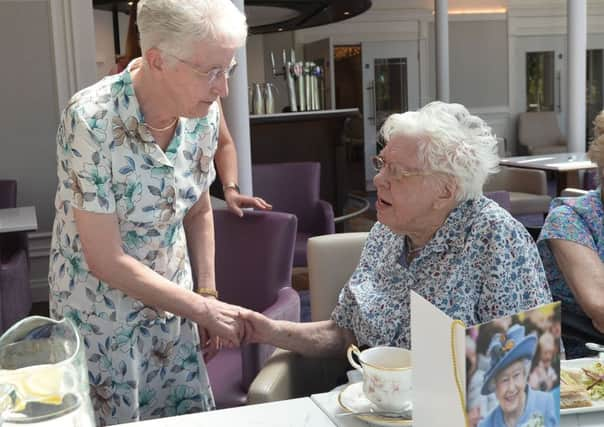Dorothy really is 80 years young, as Maud turns 109


Even so, anyone reaching that 80th milestone could be forgiven for thinking that they are getting on a bit.
On Tuesday, however, one new octogenarian celebrating her entry into her ninth decade, at the Tullyglass hotel near Ballymena, was given reason to think that she is not old at all.
Advertisement
Hide AdAdvertisement
Hide AdFor Dorothy McKee found that someone much more senior was also marking their birthday at the same venue — someone almost three decades older.
Dorothy, from Curran near Magherafelt, was born on July 3 1938, 29 years after Maud Nicholl, who was born on the same day in 1909.
Maud, from Ballymena, was also celebrating the date at Tullyglass, and the News Letter brought the 80-year-old and 109-year-old together for a photograph.
When Maud, thought to be Northern Ireland’s oldest person, realised that they shared a birthday she jokingly asked: “Who’s older?”
Advertisement
Hide AdAdvertisement
Hide AdBoth women have early memories of the two world wars, in Maud’s case the 1914-18 Great War (it only got the name First World War after there was a second), in Dorothy’s the 1939-45 war.
Asked about the former, Maud told this newspaper: “I don’t remember much about it. I remember soldiers being about, marching about. I was very young.”
Dorothy, when asked if she remembers the later global conflict, says firmly that she does (she was seven when it ended), and then says that otherwise she has lived through a privileged period in history: “It was a good time.”
Maud is now very hard of hearing but still full of life, and living independently (she never married and her last surviving close relative, her brother, died many years ago).
Advertisement
Hide AdAdvertisement
Hide Ad“I am still in living in the same house, although I was out of it for a while, but I am back into it again — would you believe that? And it’s a lovely place,” she says.
On Tuesday, as Maud enjoyed lunch at Tullglass with neighbours, friends and fellow members of Wellington Presbyterian Church, we asked about her first memories. She replied: “I remember playing about in the yard and the horses. And hanging about with my friends.”
She speaks about her friend Doreen, who lived beside her.
“I went to Galgorm school and then went into town school but she went to Cambridge House.”
Maud was thrown into helping look after the family as a child.
Advertisement
Hide AdAdvertisement
Hide Ad“My mother died and then I had to stay at home and look after the house and do all the work, baking and cooking and everything.”
• MILESTONES MAUD HAS LIVED THROUGH SINCE 1909
There are now very few people alive who lived at all during the First World War, which ended in November 1918 — even someone born in its final weeks would now be aged 100 or about to turn so.
Maud Nicholl was not only alive through the whole of the Great War, she was aged five when it began in August 1914.
Herbert Henry Asquith was prime minister of the UK on her birth date of July 3, 1909.
Advertisement
Hide AdAdvertisement
Hide AdThere were no radio stations then (they began to emerge in the 1920s) and no BBC (it was founded in 1922).
There was some emerging film but no cinemas in 1909 — movies also did not take off until the 1920s.
Widespread access to television was still half a century in the future.
By 1909, photographs had been around for more than 60 years but were still rare in newspapers and magazines.
Advertisement
Hide AdAdvertisement
Hide AdThe telephone had been invented but was still in its infancy and not widely used.
Cars were also an established modern invention by 1909, but widespread ownership was still decades away. The Ford Model T had been produced the previous year, 1908, which was thought to be the first affordable car.
The first flight had only happened in 1903 so planes were still rare in 1909 but would soon play a significant role in World War I.
Steam ships such as the Titanic, which sank in 1912, before Maud turned three, were seen as stunning examples of modern industrial prowess that made crossing the Atlantic easy for the first time.
Advertisement
Hide AdAdvertisement
Hide AdNorthern Ireland did not even exist until Maud was aged 12, with the partition of Ireland in 1921.
She was a woman of 30 when the Second World War began in September 1939 and in her 40s when the Queen began her long reign in 1952.
Maud had just turned 60, which was then considered retirement age (she worked for a while in a laundry), when man first stepped on the moon in July 1969, almost half a century ago.
She was a similar age as the Troubles began to emerge and was approaching her nineties when the 1998 Belfast Agreement was signed.